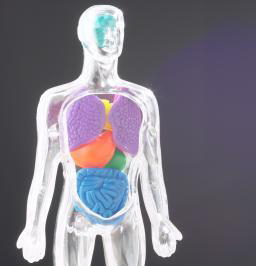Indians play major role in mapping human protein
 Bangalore, May 29 : The existence of several novel proteins in the human body that were never observed or predicted has been uncovered in a two-year project conducted by a group of Indian American scentists and their counterparts here, creating what has been described as a "catalogue" that is now available as an interactive web-based resource.
Bangalore, May 29 : The existence of several novel proteins in the human body that were never observed or predicted has been uncovered in a two-year project conducted by a group of Indian American scentists and their counterparts here, creating what has been described as a "catalogue" that is now available as an interactive web-based resource.
It was more than a decade ago that scientists published the draft human genome sequence - an inventory of all the genes in humans - under the Human Genome project. However, an equivalent map for the human "proteome" with direct measurements of proteins and peptides did not exist so far.
The "proteome" project that involved cataloguing the proteins was led by Akhilesh Pandey and co-workers at the Johns Hopkins University (JHU) in the US and Harsha Gowda and his team at the Institute of Bioinformatics (IOB) here. Over 70 scientists - most of them Indians - were involved in the study.
The team made the most unexpected finding that 193 novel proteins that they found actually came from those regions of the DNA - the so-called non-coding regions - that are not supposed to code for proteins, suggesting that the human genome is more complex than previously thought.
In all, the team identified proteins encoded by 17,294 genes, accounting for approximately 84 percent of the total annotated protein-coding genes in humans.
"To our knowledge it is the largest coverage of the human proteome reported so far," Pandey told IANS in an email interview.
In what should be a matter of great honour for Indian science, the proteome project has been featured on the cover page of the May 29 issue of the prestigious "Nature" journal.
"This project is a fifty-fifty partnership (of scientists of the two countries)," with funding from agencies of both governments Pandey said.
Studying proteins is far more technically challenging than studying genes. And a mere list of existing proteins would not be very helpful without accompanying information about where in the body those proteins are found.
Pandey compared the human body to a huge library where each protein is a book. So far, scientists did not have a catalogue that gives the titles of the available books and where to find them. "We think we now have a good first draft of that comprehensive catalogue," Pandey said.
The research team accomplished this by taking samples of 30 human tissues, extracting their proteins and using enzymes to cut them into smaller pieces, called peptides. They then ran the peptides through a series of instruments designed to deduce their identity and measure their relative abundance.
This human proteome catalogue that has been prepared is now available as an interactive web-based resource in the internet. Pandey said it will complement available human genome and other data to accelerate biomedical research in health and disease.
"Although India did not participate in the human genome project, completion of a human proteome map by this team puts India at the forefront of the international efforts to characterize the human proteome," IOB's Gowda said in a statement.
Describing the IOB-JHU collaboration as an "excellent model," Srivatsa Krishna, the Karnataka government's secretary for biotechnology, said: "We need to encourage such initiatives that establish India at the very forefront of science and set an example for the rest of the world."(IANS)